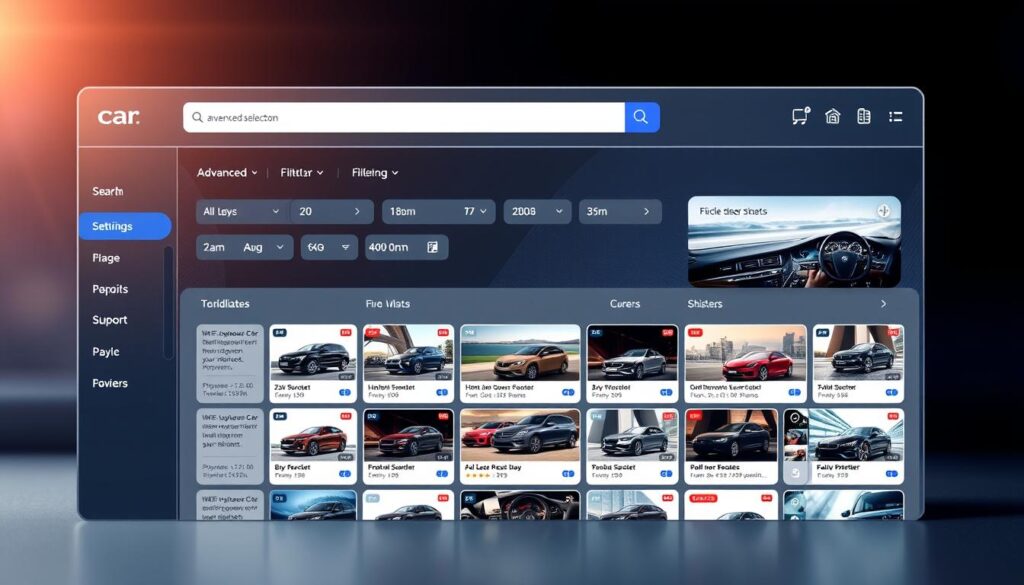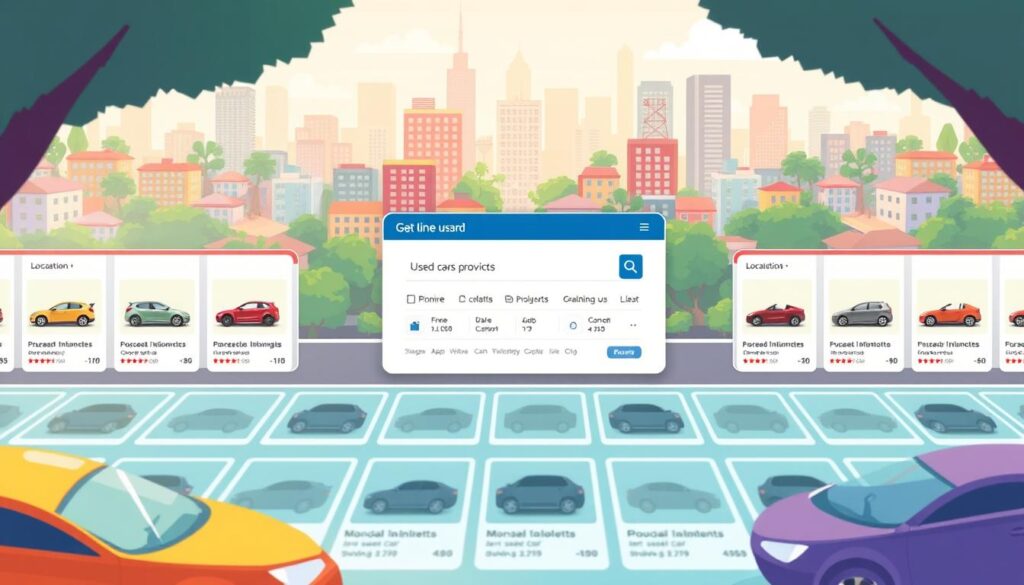Looking for your next ride? Modern online tools have transformed how shoppers find pre-owned vehicles. Today’s platforms gather thousands of listings from dealerships and private sellers, letting you compare options side by side. No more driving across town or sifting through endless ads—everything’s in one place.
These resources go beyond basic searches. Want a specific trim level or color? Filter by mileage, location, or even certified pre-owned status. Many platforms include vehicle history reports and tools like Kelley Blue Book valuations, helping you spot a fair price. This data-driven approach takes the guesswork out of negotiations.
Transparency matters, too. Leading sites like Autotrader and CarGurus prioritize user-friendly experiences, avoiding cluttered ads or hidden fees. Whether you’re exploring financing options or checking market trends, these tools put you in control. Let’s dive into how they work—and how they’ll save you time and money.
Key Takeaways
- Modern platforms aggregate thousands of pre-owned vehicle listings from dealers and private sellers.
- Advanced filters let you narrow choices by features, mileage, price, and certification status.
- Tools like VIN reports and price calculators help assess value and avoid overpaying.
- Top sites prioritize transparency, offering ad-free browsing and verified reviews.
- Comparing multiple platforms ensures you find the right fit for your needs and budget.
Overview of Top Car Search Engines in the U.S.
The U.S. market offers multiple paths to finding your ideal vehicle. Some platforms act like digital megamalls, while others resemble boutique stores. This variety helps shoppers match their priorities—whether that’s nationwide selection or local expertise.
Where Choice Meets Convenience
Sites like Autotrader and Cars.com dominate with extensive inventories spanning thousands of dealers. These hubs let you filter by body style, drivetrain, or even fuel efficiency. Built-in calculators estimate monthly payments, while customer reviews reveal real-world ownership experiences.
Aggregators vs. Dealership Networks
Third-party aggregators compile listings from various sources, including private sellers. This approach offers diverse options but requires extra vetting. Dealer-specific platforms often provide certified pre-owned vehicles with warranties—ideal for buyers prioritizing peace of mind.
| Platform Type | Sources | Key Tools | Perks |
|---|---|---|---|
| Aggregators | Dealers + Private Sellers | Price Comparisons | Wider Selection |
| Dealer Networks | Single Franchise | Trade-In Estimators | Certified Vehicles |
Transparency varies between models. Aggregators often highlight market value trends, while dealer sites may focus on exclusive inventory. Understanding these differences helps narrow your options before test-driving.
Features That Set Modern Car Search Engines Apart
Today’s vehicle shoppers expect more than basic search boxes. Leading platforms now blend cutting-edge tech with real-time market insights, transforming how people find pre-owned rides. Let’s explore the tools reshaping automotive discovery.

Pinpoint Your Perfect Match
Forget scrolling through irrelevant listings. Top sites let you filter by:
- Exact features like heated seats or sunroof
- Mileage ranges down to the last 1,000 miles
- Seller types (dealerships vs. private owners)
Autotrader’s “Advanced Filters” even sort by engine type or towing capacity. This precision helps buyers avoid decision fatigue while comparing options.
Trust Through Transparency
Modern platforms arm shoppers with critical data. Free VIN checks reveal accident history, while price calculators like CarGurus’ Instant Market Value show fair pricing ranges. One user shared:
“The VIN report saved me from buying a flood-damaged SUV. I didn’t know to ask!”
| Feature | Benefit | Example Platforms |
|---|---|---|
| Custom Filters | Find exact specs faster | Autotrader, Cars.com |
| VIN Reports | Uncover hidden issues | CarGurus, AutoCheck |
| Price Alerts | Catch deals instantly | TrueCar, Edmunds |
These innovations create smarter buyers. Automated tools track price drops, and saved searches notify you when new matches arrive. No more manual checking—the platform does the legwork.
Leveraging the Best Car Search Engine for Your Car Buying Journey
Smart shoppers know that modern tools turn hours of research into minutes. Platforms with thousands of options let you skip endless dealership trips. Everything from trim packages to maintenance records sits at your fingertips.
How Comprehensive Listings Save Time and Money
Imagine finding five similar vehicles across different sellers in one click. Advanced filters sort by year, mileage, or even seller reputation. One buyer shared:
“I found my Jeep in 20 minutes—no more weekends wasted at lots.”
Real-time price tracking shows market trends, so you know when to strike. Dealers often update listings daily, ensuring you see fresh inventory first. This transparency helps avoid overpaying for popular models.
| Feature | Time Saved | Money Saved | Example |
|---|---|---|---|
| Price Tracking | 3+ hours/week | Up to $1,200 | Cars.com Price Trends |
| Side-by-Side Comparisons | 45 mins/research | Identifies hidden fees | AutoTrader Compare Tool |
| VIN Checks | 2 days of inspections | Prevents costly repairs | CarGurus History Reports |
Integrated calculators estimate total costs, including taxes or financing. This negotiating power puts buyers in control. Why settle for guesswork when data-driven choices exist?
Understanding Consumer Benefits in Car Buying
Transparency drives smarter purchases in today’s automotive market. Platforms prioritizing unfiltered insights cut through the noise of traditional sales tactics. Shoppers gain clarity through tools designed to reveal what matters most—reliable feedback and fair pricing.

Access to Honest Reviews and No Sponsored Listings
Trustworthy platforms like CarEdge eliminate pay-to-play arrangements. Their ad-free layouts ensure every listing competes on merit, not marketing budgets. Users report:
“I spotted a 2020 SUV with clean history reports—no hidden accident damage.”
Third-party review systems let buyers assess vehicles and sellers. Verified ratings highlight dealers with consistent service quality. This approach weeds out unreliable options before you visit a lot.
| Feature | Buyer Advantage | Example |
|---|---|---|
| No Sponsored Listings | Equal visibility for all sellers | CarEdge’s neutral ranking |
| Unedited Reviews | Authentic user experiences | Dealer response rates |
| Price Histories | Identifies inflated pricing | 90-day trend graphs |
Complete vehicle histories empower negotiations. Seeing maintenance records or past ownership details builds confidence. One buyer avoided a used sedan with three prior accidents using free VIN checks.
These tools transform stress into strategy. With clear data-driven choices, you’ll spend less time doubting and more time driving.
Exploring Data-Driven Insights and Pricing Tools
Numbers don’t lie—especially when shopping for pre-owned vehicles. Modern platforms analyze millions of data points to show what a vehicle should cost based on its history and market demand. This shift from guesswork to precision helps buyers spot fair deals faster.
Using Historical Data and Depreciation Calculators
Kelley Blue Book’s depreciation tool predicts how specific models lose value over time. Enter a make and year—it’ll forecast resale prices for the next five years. One buyer avoided a $2,500 overpayment on a sedan using this feature:
“The calculator showed the model drops 18% yearly. I waited two months and saved big.”
CarGurus’ price trend graphs reveal seasonal dips and spikes. Trucks often cost more in winter, while convertibles peak in spring. Tools like these answer critical questions:
- Is this price aligned with similar listings?
- How much will maintenance cost in three years?
- When’s the optimal time to buy this vehicle type?
| Tool | Key Feature | Benefit | Example |
|---|---|---|---|
| Depreciation Calculator | 5-year value forecast | Avoid overpaying | KBB Resale Tool |
| Price Trend Tracker | 90-day market analysis | Identify discount periods | CarGurus Market Report |
| Ownership Cost Estimator | Includes insurance + repairs | Budget accurately | Edmunds True Cost to Own |
These real-time insights integrate seamlessly into listing pages. Hover over a price to see how it compares to regional averages. Platforms now flag listings priced 10% above market value, giving buyers instant negotiation leverage.
Armed with this data, shoppers can confidently discuss numbers with sellers. No more wondering if that SUV’s price reflects its actual worth—the tools spell it out.
Enhancing User Experience in the Digital Car Marketplace
Digital tools have reshaped how we shop for vehicles, prioritizing ease over complexity. Platforms now focus on simplified layouts that remove distractions, letting buyers concentrate on what matters—finding the right match. This shift toward user-first design makes comparing options faster and less stressful.

Ad-Free Platforms and Intuitive Navigation
Sites like CarEdge prove clutter-free browsing matters. Their ad-free approach eliminates sponsored listings, ensuring every vehicle competes on merit. One user noted:
“I found three solid options in 10 minutes—no pop-ups or sneaky dealer promotions.”
Key navigation upgrades include:
- One-click filters for price, mileage, and features
- Saved searches that update via email alerts
- Side-by-side comparison tools with real-time pricing
| Platform | Key Feature | User Benefit |
|---|---|---|
| CarEdge | Zero sponsored ads | Unbiased results |
| AutoTempest | Unified search across sites | Wider selection |
| CarsDirect | Step-by-step filters | Faster matchmaking |
These improvements cut average search times by 40%, according to recent surveys. Clean interfaces also reduce errors—like missing a critical filter or overlooking a listing. When every click counts, smart design keeps you on track.
Modern platforms transform frustration into focus. With tools that adapt to your needs, you’ll spend less time clicking and more time discovering hidden gems.
Navigating Local and National Used Car Listings
Finding the right vehicle involves balancing local availability with nationwide options. Platforms like Craigslist and CarMax specialize in location-based searches, while aggregators cast a wider net. Zip code filters and regional search tools let you prioritize nearby sellers—or expand your radius for rare models.

Why Proximity Matters
Local dealers often provide perks like extended warranties or certified pre-owned programs. CarMax, for instance, offers 30-day returns on many vehicles, reducing buyer risk. One shopper shared:
“I inspected three SUVs in person the same day I found them online. The dealer handled paperwork onsite.”
Private sellers on platforms like Facebook Marketplace may offer lower prices. However, always verify ownership documents and maintenance records before committing.
| Source | Key Advantage | Consideration |
|---|---|---|
| Local Dealers | In-person test drives | Higher pricing |
| National Aggregators | Thousands of options | Shipping fees |
| Private Sellers | Negotiable prices | Limited warranties |
Use these strategies to streamline your hunt:
- Set search alerts for specific makes within 50 miles
- Compare price histories on platforms like CarGurus
- Request video walkarounds for distant listings
Balancing local convenience with national selection helps you secure quality without compromise. A buyer in Denver recently found a well-maintained sedan through a mix of AutoTrader’s regional filters and Craigslist alerts.
Conclusion
Modern vehicle shopping has evolved beyond dealership visits and classified ads. Today’s platforms combine real-time data with intuitive tools, transforming how buyers find quality used cars. From pinpoint filters to verified history reports, these resources simplify every step.
Advanced features like price trend trackers and side-by-side comparisons remove guesswork. Shoppers can assess fair market values instantly, avoiding overpriced listings. Third-party VIN checks add another layer of confidence, revealing hidden issues before negotiations start.
Platforms prioritizing transparency—like ad-free layouts and unedited reviews—level the playing field. Whether exploring local inventory or national listings, these tools help identify trustworthy sellers. One recent buyer saved weeks by setting alerts for specific models within their budget.
Your next step? Compare multiple platforms using the insights shared here. Aggregators offer variety, while dealer networks provide certified options. With the right strategy, you’ll drive off knowing you made a smart, informed choice.
